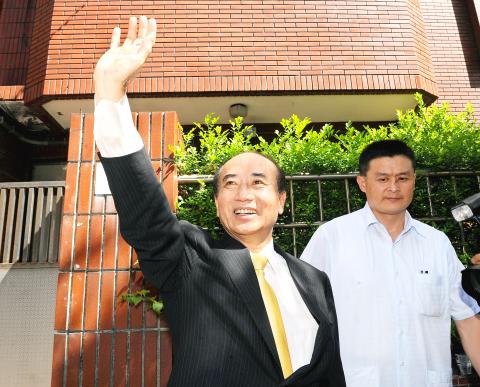The Taipei District Court yesterday ruled in favor of Legislative Speaker Wang Jin-pyng’s (王金平) provisional injunction seeking to retain his Chinese Nationalist Party (KMT) membership and position as head of the legislature.
The court ruled that Wang would be able to retain his membership and rights as a KMT member after submitting a guarantee of about NT$9.38 million (US$314,300), Taipei District Court spokesperson Lai Chien-yi (賴劍毅) told reporters.
The guarantee was calculated based on Wang’s monthly salary and the remainder of his current term of about two-and-a-half years, Lai said.

Photo: Fang Pin-chao, Taipei Times
The ruling was considered a victory for Wang in his battle with President Ma Ying-jeou (馬英九) to keep his political power.
‘ILLEGAL LOBBYING’
The 72-year-old senior politician, who has been accused of being involved in illegal lobbying of the judiciary, had his KMT membership revoked on Wednesday, which the party said should invalidate his status as a KMT legislator-at-large and as legislative speaker.
Wang decided to take the matter to court after the KMT failed to grant him a 20-day appeal period and immediately notified the Central Election Commission (CEC) about Wang’s party membership being revoked.
The court rejected the KMT’s offer of a counter guarantee in its challenge to Wang’s claim, Lai said.
Wang’s injunction was accepted because his loss of position as legislative speaker and a legislator-at-large would be irreversible if the injunction was rejected, Lai said, adding that Wang’s membership would not be affected before another civil lawsuit that Wang had filed said otherwise.
An additional temporary restraining order filed by the Wang camp late on Thursday night, which argued that Wang should retain his position as speaker, was dismissed, the spokesperson said.
Wang’s lawyer, Hsu Ying-chieh (許英傑), told reporters that the ruling was “a complete victory” in terms of the provisional injunction, despite dismissal of the restraining order.
“We are glad the judges have made a critical decision in this historic case,” Hsu said.
The lawyer said the court’s upholding of Wang’s claim was crucial because the KMT’s decision was a revocation of his party membership rather than as a lawmaker or speaker.
“As the revocation of Wang’s party membership was invalidated, the KMT’s moves after the revocation have been nullified as well, which means the CEC’s notification to void Wang’s speaker position was ineffective,” Hsu said.
Chen Ming (陳明), the KMT’s lawyer, told reporters that his client planned to file an appeal within 10 days.
Chen claimed that Wang was disqualified as a KMT legislator-at-large and as legislative speaker immediately after his party membership was revoked.
At around 9:30pm last night, Wang delivered a short statement calling for unity within the party “under the leadership of President Ma Ying-jeou” to work together to meet shared challenges.
Wang reiterated that he will be a KMT member “forever and ever.”

INVESTIGATION: The case is the latest instance of a DPP figure being implicated in an espionage network accused of allegedly leaking information to Chinese intelligence Democratic Progressive Party (DPP) member Ho Jen-chieh (何仁傑) was detained and held incommunicado yesterday on suspicion of spying for China during his tenure as assistant to then-minister of foreign affairs Joseph Wu (吳釗燮). The Taipei District Prosecutors’ Office said Ho was implicated during its investigation into alleged spying activities by former Presidential Office consultant Wu Shang-yu (吳尚雨). Prosecutors said there is reason to believe Ho breached the National Security Act (國家安全法) by leaking classified Ministry of Foreign Affairs information to Chinese intelligence. Following interrogation, prosecutors petitioned the Taipei District Court to detain Ho, citing concerns over potential collusion or tampering of evidence. The

NEGOTIATIONS: Taiwan has good relations with Washington and the outlook for the negotiations looks promising, Minister of Economic Affairs J.W. Kuo said Taiwan’s GDP growth this year is expected to decrease by 0.43 to 1.61 percentage points due to the effects of US tariffs, National Development Council (NDC) Minister Paul Liu (劉鏡清) said at a meeting of the legislature’s Economics Committee in Taipei yesterday, citing a preliminary estimate by a private research institution. Taiwan’s economy would be significantly affected by the 32 percent “reciprocal” tariffs slapped by the US, which took effect yesterday, Liu said, adding that GDP growth could fall below 3 percent and potentially even dip below 2 percent to 1.53 percent this year. The council has commissioned another institution

NEGOTIATIONS: The US response to the countermeasures and plans Taiwan presented has been positive, including boosting procurement and investment, the president said Taiwan is included in the first group for trade negotiations with the US, President William Lai (賴清德) said yesterday, as he seeks to shield Taiwanese exporters from a 32 percent tariff. In Washington, US Trade Representative Jamieson Greer said in an interview on Fox News on Thursday that he would speak to his Taiwanese and Israeli counterparts yesterday about tariffs after holding a long discussion with the Vietnamese earlier. US President Donald Trump on Wednesday postponed punishing levies on multiple trade partners, including Taiwan, for three months after trillions of US dollars were wiped off global markets. He has maintained a 10 percent

TRADE: The premier pledged safeguards on ‘Made in Taiwan’ labeling, anti-dumping measures and stricter export controls to strengthen its position in trade talks Products labeled “made in Taiwan” must be genuinely made in Taiwan, Premier Cho Jung-tai (卓榮泰) said yesterday, vowing to enforce strict safeguards against “origin laundering” and initiate anti-dumping investigations to prevent China dumping its products in Taiwan. Cho made the remarks in a discussion session with representatives from industries in Kaohsiung. In response to the US government’s recent announcement of “reciprocal” tariffs on its trading partners, President William Lai (賴清德) and Cho last week began a series of consultations with industry leaders nationwide to gather feedback and address concerns. Taiwanese and US officials held a videoconference on Friday evening to discuss the